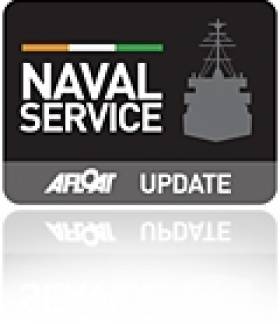Displaying items by tag: Naval Service Commissioning Ceremony
Minister For Defence Attends Naval Service Commissioning Ceremony In Cork
Minister for Defence, Mr. Tony Killeen, TD today attended the Naval Service Commissioning Ceremony of the 48th Naval Service Cadet Class at Haulbowline in Cork.
The Minister was welcomed to the Naval Base by the Deputy Chief of Staff (Operations), Major General Ralph James and the Flag Officer Commanding the Naval Service, Commodore Frank Lynch.
Speaking at the Commissioning Ceremony for 5 members of the 48th Naval Cadet Class, Minister Killeen said: "Today's ceremony is the culmination of two years of hard work and dedication by these five young people. Over the last two years they have undergone a rigorous training programme, covering both professional and academic subjects, and of course hands on experience on the high seas. The training they have received has equipped these young professionals with the skills necessary to face the many and varied challenges they will encounter in the course of their military careers. They have successfully achieved the high standards required of them in a wide variety of activities and I have no doubt that they will be at the helm of the development of the Naval Service long into the future."
Minister Killeen added: "As you will all be aware, my colleague the Minister for Finance and I were very pleased to be able to announce during our recent visit to the Naval Base that Government approval had been granted for the purchase of two new Offshore Patrol Vessels for the Naval Service.
"The Government's decision is of course subject to the negotiations with the preferred bidder, Babcock Marine, reaching a satisfactory conclusion. Today, I am delighted to report that very good progress has been made since the announcement and I am confident that I will be in a position to formally place a contract within a number of weeks.
"It is indeed very heartening that such positive news for the Naval Service coincides with the commissioning today of this new class of cadets. These young officers can look forward to careers which will be served on these modern new vessels.
"The Naval Service makes an important contribution across a wide variety of roles assigned by Government. The success of the Naval Service in the areas of fishery protection, search and rescue and the provision of aid to the civil power is clear for all to see. These high profile roles have the added benefit of conveying the importance of the Naval Service to the wider community. In this context, as Minister for Defence, I am committed to continuing the development of the Naval Service to ensure that it is capable of fulfilling the full range of tasks assigned to it by the Government. To this end there is a Cadetship competition currently being held in order to recruit a total of thirty Cadets, six of whom will join the Naval Service. It is anticipated that their training will commence in December of this year.
"I would like to pay tribute to the Naval College staff involved in preparing these cadets for officer duty. Today however, belongs primarily to these new officers. They are charged with providing leadership and guidance to others, a responsibility, I have no doubt they will discharge with excellence", the Minister concluded.





























































